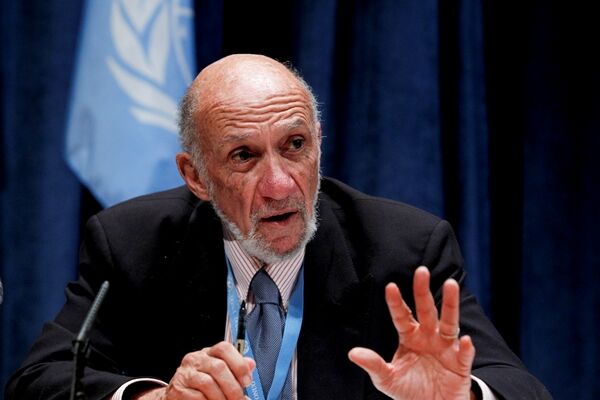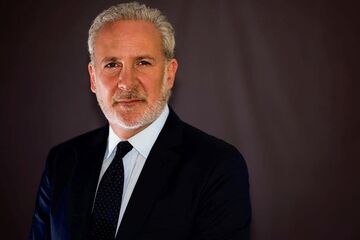Richard Anderson Falk, United Nations Special Rapporteur on "the situation of human rights in the Palestinian territories occupied since 1967, says the result of Israeli election will give rise to a new wave of pro-Palestinian activism in the Islamic World, including at the UN, and perhaps more widely.
Following is the full text:
Q: Israel's Knesset elections ended with the victory of Benjamin Netanyahu's right-wing coalition. Many analysts believe that the cabinet headed by him will be the most right-wing cabinet in Israel. What is the effect of Netanyahu's victory on the region?
A: The anti-Netanyahu political parties in Israel were united around a platform that contained few substantive changes from the policies expected to be pursued by the Netanyahu coalition, their focus was devoted almost exclusively to stop Netanyahu from having an incredible sixth opportunity to become the next Prime Minister of the country. It is now generally agreed that the election results are significant beyond the failure to block Netanyahu’s return to governing authority. What has emerged as potentially important is that Likud’s winning coalition depended on teaming up with the openly racist extremist Religious Zionism Party, a political alliance of two far right religious parties that put the completion of the settler colonialist project at the top of their explicit agenda, although phrased in the language of Zionism.
The alliance of these two extremist ultra-religious parties gained 14 seats in the Knesset, the third most, and emerged not only as a strategic partner in Netanyahu’s return to power, but seems likely to provide indispensable political glue needed by Netanyahu to prevent his crash landing in the months and years ahead. This vulnerability will make Netanyahu, a master tactician and opportunist, susceptible to the extremist priorities of these ultra-Zionist allies, starting by forming a cabinet that includes the leaders of the two political groupings making up the Religious Zionism, such notoriously fascist Israeli political personalities as Itamar Ben Gvir, and possibly even Bezabel Smotrich.
I think the regional impacts will be a gradual downgrading of the normalization diplomacy of the UAE, Bahrain, Oman, and Morocco initiated during the Trump presidency under the banner of the Abraham Accords, continued by Biden within a normalization framing. These overt arrangements reflecting bargains by the highly pragmatic Arab governing elites that had long dealt with Israel on matters of joint interests more discreetly. Such reactions will undoubtedly take seriously the sentiments of the outraged public opinion by Arab masses who remain overwhelmingly supportive of the Palestinian struggle for basic rights. I expect that this Israeli election, more than others, will give rise to a new wave of pro-Palestinian activism in the Islamic World, including at the UN, and perhaps more widely.
But Netanyahu’s leadership is also extremely worrisome on other grounds, especially his obsessive hostility to Iran that centers on suspicions about Iran’s nuclear program. This belligerent approach to Iran is likely to produce militarist provocations that will increase risks of a major regional war. Netanyahu is not only fiercely opposed to the renewal of the 2015 Nuclear Agreement (JCPOA), but exhibits a seeming readiness to take unilateral military action against Iran with the goal of disrupting if not destroying its alleged ambitions to acquire nuclear weapons once and for all.
At the same time, we can expect Netanyahu to ignore, if not renounce, the widely supported UN General Assembly urging Israel to give up its nuclear arsenal and abide by the inspection provisions of the Nonproliferation Treaty regime. The Resolution (A/C.1/77/L.2) adopted on October 30, 2022 by a vote of 152-5 (24 abstentions) in the First Committee of the General Assembly; of the five were unsurprisingly U.S., Israel, and Canada, joined by Palau and Micronesia. Such a resolution introduces some balance into negotiations pertaining to Iran, which have so far ignored Israel’s nuclear weapons capability undermining both proliferation constraints and denuclearizing imperatives.
Q: Netanyahu won while the Arab League meeting emphasized the Arab peace plan. What actions may Netanyahu take to undermine the Arab peace plan?
A: Netanyahu’s primary concerns in the period ahead will be to gain acceptance within Israel of his rightest leadership that will probably emphasize the threats posed by Iran to Israeli security. Even prior to these Israeli elections there were growing indications of discontent with the normalization diplomacy initiated by Trump and continued by Biden. For instance, the leading Israeli liberal Zionist print media platform, Haaretz editorialized: “The Israeli election dealt a grievous blow to Judaism.” In effect, that Jews elected a leadership that was programmed to push this already expansionist Zionist political entity in the direction of openly embracing ethno-nationalist values and policies, which because of Palestinian demographic presence and continuing resistance will exert new pressures to introduce a new phase of ethnic cleansing and territorial expansionism.
Even without the problem of a coalition dependent on the Religious Zionist Alliance, Netanyahu and his Likud Party have not the slightest intention of lending credibility to any Arab proposal for a negotiated peace, and especially one that revives the 2002 Plan put forward by King Abdullah of Saudi Arabia. Israel public opinion seems firmly united around the idea that there is no longer the need to offer, even as earlier for the sake of public relations, the Palestinians national sovereignty or a meaningful form of statehood. The whole spectrum of opinion in the new Knesset lineup is to secure Jewish supremacy in as much of ‘the promised land’ as possible, which means continued settlement expansion in the West Bank, punitive occupation in Gaza, and exclusivist Israeli governance of Jerusalem as the eternal capital of the Jewish people with increasing pressures on Palestinian residents to live elsewhere, preferably outside of Israel. For almost a decade it has become clear to anyone with eyes that wanted to see the realities on the ground that Israel had abandoned all pretenses nurtured by the Oslo Diplomacy to bring peace through negotiations of the parties, instead relying on peace sustained by what is now widely understood to be the Israeli apartheid state.
Q: Netanyahu's victory comes while the democratic government is at work in America and insists on the two-state solution. What will be the relationship between Israel and the US considering Netanyahu's rise to power?
A: Contrary to the wording of your questions there is no U.S. ‘insistence’ on the two-state solution, only an empty rhetorical posture belied by the language of ‘strategic partnership’ highlighted in the Biden-Lapid Jerusalem Declaration of last July. If Netanyahu is openly supportive of the religious extremists, his new indispensable allies, it will make Washington Democrats and liberal Zionists nervous and uncomfortable, producing some lowering of public enthusiasm for Israel, but without foreseeable policy consequences. It seems inconceivable at this point that there will be a groundswell of opposition in the U.S. calling for an abandonment of the bilateral partnership on regional security issues, including the annual $3.8 billion U.S. economic assistance given to Israel or American continuing efforts at the UN and elsewhere to shield Israeli policies and practices when it comes to dealing with Palestinian resistance or grievances, compliance with international law, and even with its special status as a known but still undeclared nuclear weapons state.
Q: Considering Netanyahu's serious opposition to the JCPOA, how do you see the prospect of reviving the JCPOA?
A: I think it highly unlikely that JCPOA will be revived. The U.S. might be prepared to reach agreement with Iran absent Netanyahu’s record of opposition that goes back to its origins during the Obama presidency. Biden has strongly indicated that the domestic political costs are too high to break openly with Israel on such a crucial issue. The power struggle for political control of the United States is at a critical phase and no mainstream liberal leader, such as Biden, is remotely likely to weaken Jewish support by openly alienating Netanyahu. Besides, even before the Israeli elections, Israeli back-channel pressures were influencing the Biden presidency to insist on unacceptable concessions from Iran. Given the background of Trump’s 2018 withdrawal, coupled with the ramping up of sanctions despite Iran’s internationally verified compliance with the agreement, should have led the U.S. to offer apologies and an incremental removal of sanctions rather than put forward additional demands. The Trump/Biden sanctions have brought prolonged economic hardship to the people of Iran.
Q: Netanyahu is Putin's friend, and the relations between Israel and Russia are bad after the war in Ukraine. It seems that Netanyahu has to choose between America and Russia. What is your assessment?
A: I think there is little doubt that if such an existential choice ever were to confront Netanyahu, he would have not had a moment’s hesitation about choosing America. It is not only the years of closeness, but the U.S. is the more formidable geopolitical actor in the Middle East and the world than Russia, and actively helps Israel militarily and diplomatically. Besides, the Jewish presence in the United States has great leverage over foreign policy, and although somewhat less supportive of Israeli behavior than in the past, continues to regard Israel’s security and wellbeing as an unconditional commitment, and defies the apartheid consensus by continuing to include Israel in the ranks of countries governed as ‘democracies.’
Of course, Netanyahu would like to maintain friendship with both Russia and the United States if this can be managed. The Ukraine War, should it be further prolonged, might induce Netanyahu to side more openly with the U.S./NATO, especially in light of the difficulties arising from including the religious extremists in his governing process with their undeniable hostility to a two-state solution. Their priority is to move toward ethnic cleansing of Palestinians to complete the ultra-Zionist project of settler colonialism, which either requires the elimination of the Palestinians from Israel altogether or at minimum their further marginalization through crushing Palestinian resistance morale. How Netanyahu handles this open departure from Washington’s two-state mantra will give hints as to his approach to other issues where pressure arises if Israel rejects the American effort to adopt a posture, however insincere, that does not explicitly reject basic Palestinian objectives. We must wait and see how the likely political drama unfolds.
Netanyahu has early tried to convey an impression that he is not captive of the Religious Zionism by indicating his continuing support for LGBTQ freedoms and rights. Whether this is a true demonstration of Netanyahu’s political independence or a symbolic marginal gesture that is to be balanced by an unpopular implementation of the radical policy views of Religious Zionism. It is this cloud of uncertainty that hangs over prospects for renewed Netanyahu/Likud governance of Israel.















نظر شما